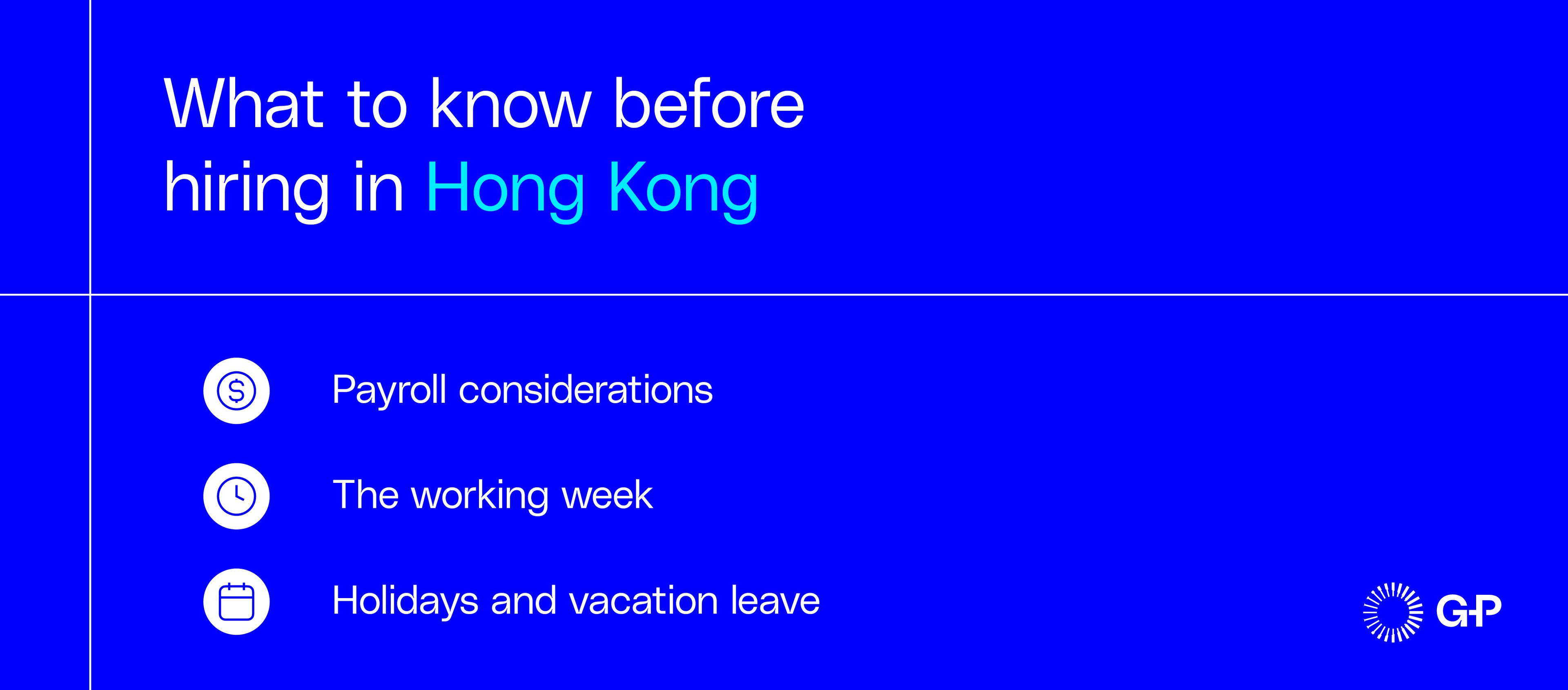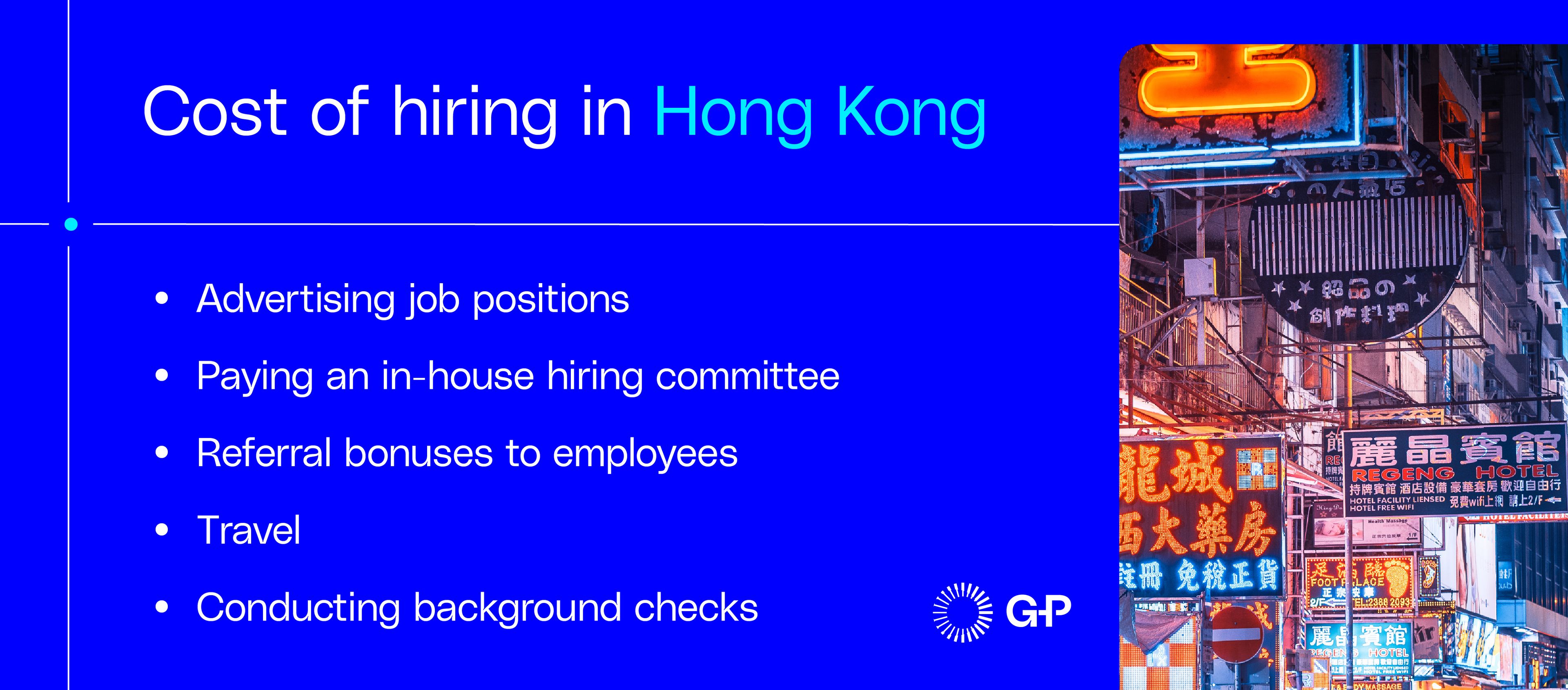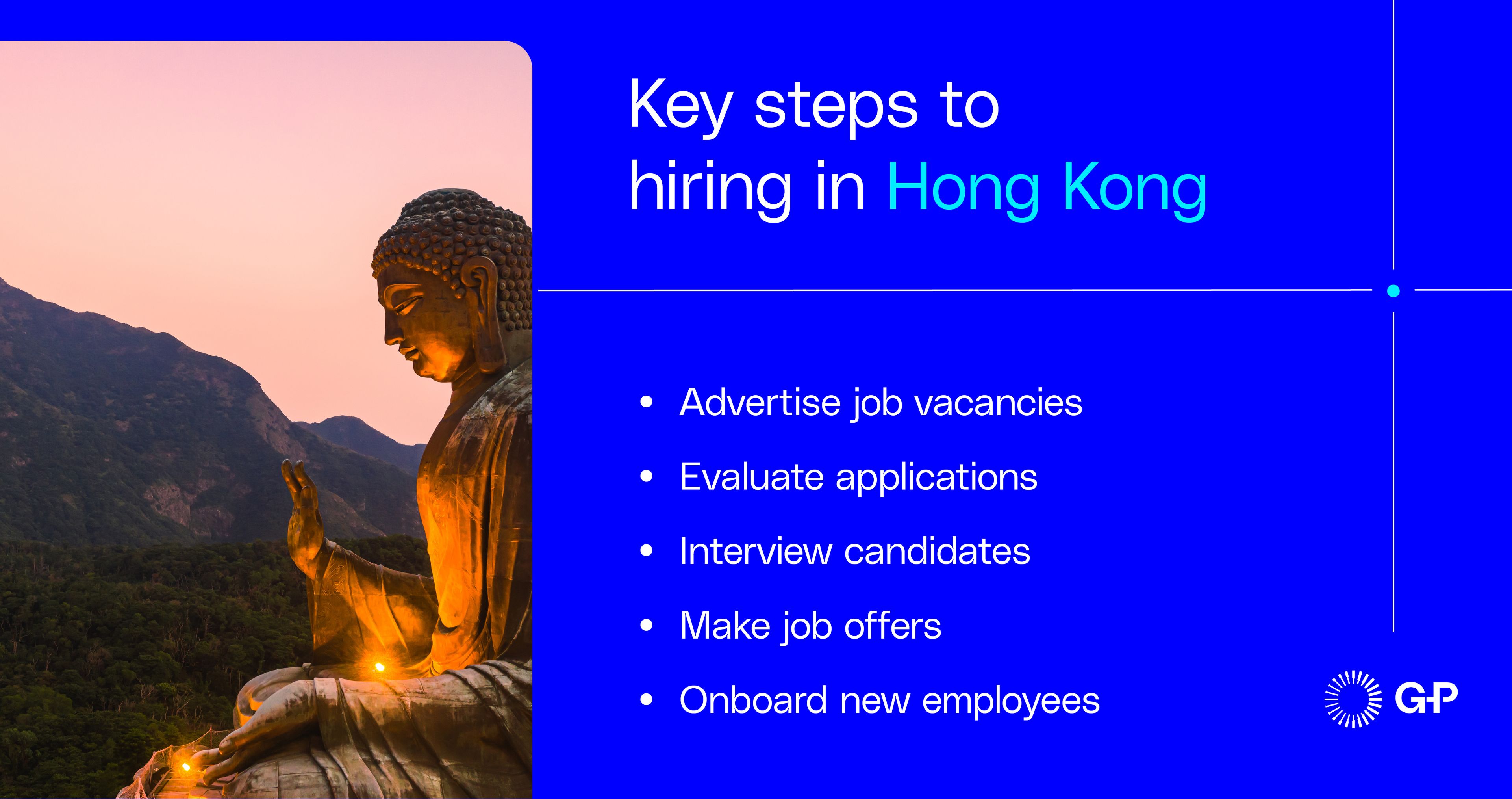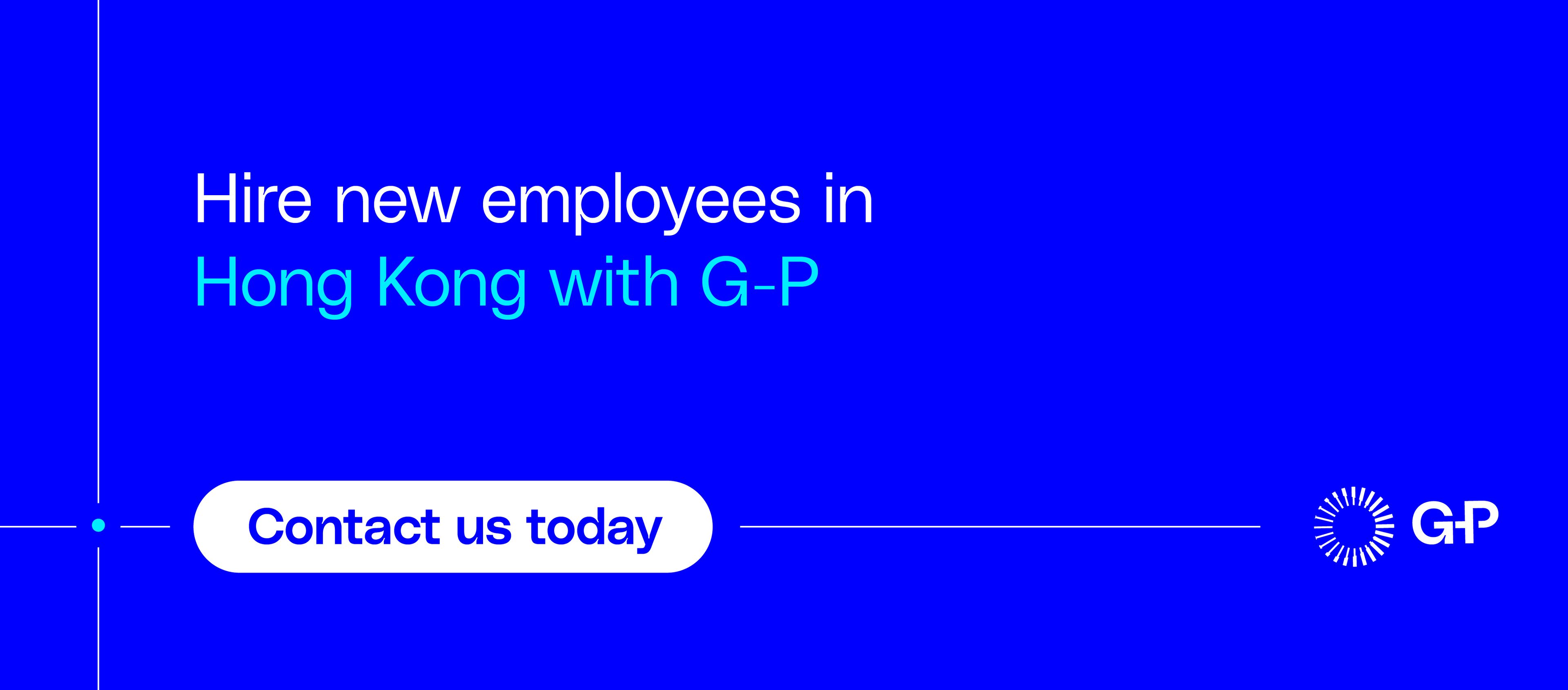Hong Kong is a special administrative region (SAR) of China under the "one country, two systems" framework. It has its own currency, judicial system (common law), and police force. Hong Kong is a great place for global companies to do business. Its economy is characterized by free trade, low taxation, and minimal government intervention.
Before expanding into Hong Kong, you’ll need to understand contracts, taxes, wages, benefits, and other employment laws. Our guide will tell you everything you need to know about hiring in Hong Kong.
What to know before hiring in Hong Kong

If you’re expanding your business into Hong Kong for the first time, there are important legal requirements to be aware of. These norms and laws influence hiring practices in Hong Kong and many aspects of the employer-employee relationship, including compensation and benefits.
G-P Gia™, our AI-powered global HR agent, can answer your toughest compliance questions across 50 countries — including Hong Kong — and all 50 U.S. states. Reduce your reliance on outside counsel and cut the time and cost of compliance by up to 95% with Gia.
Here are five things to know about hiring in Hong Kong.
1. Languages in Hong Kong
English is one of the official languages of Hong Kong, alongside Mandarin Chinese, and is especially common in business settings. Cantonese, which differs from Mandarin Chinese, is the most commonly spoken language in Hong Kong.
Because of the western influence in Hong Kong and the wide use of English, you can find that some job applicants have both a Chinese name and a western name that is designed to be easier for global employers to pronounce and remember. Make sure you know which name a person prefers.
2. Payroll considerations in Hong Kong
The minimum wage in Hong Kong is reviewed every two years. It’s currently HKD 40 per hour (2025).
Payroll in Hong Kong is considered straightforward. Employers aren’t required to withhold income tax from employees’ salaries. Employees are responsible for filing and paying their own taxes to the Inland Revenue Department (IRD). However, employers have to prepare and provide annual tax forms (such as the IR56B) to both the IRD and the employee.
Both employers and employees contribute to the Mandatory Provident Fund (MPF). The standard contribution rate is 5%.
There’s no statutory requirement for employers to withhold funds for healthcare. Hong Kong’s public healthcare system is funded through general taxation, not payroll deductions.
3. Hong Kong workweek
Hong Kong doesn’t have any regulations on the maximum hours employees can work. The average employee works about 42 hours per week. While the government leaves working hours up to employers and employees, one rest day out of every seven is mandated. This rest day tends to fall on Sundays, but employers can choose a rest day that makes sense for their company. If an employer ignores this requirement, they can incur heavy fines.
4. Holidays and vacation leave in Hong Kong
There are 13 national holidays in Hong Kong. Employees on a continuous contract (at least 18 hours per week for four consecutive weeks) get holiday pay after three months. If a holiday falls on a rest day, the employer has to give a substitute holiday. This should be another day off within 60 days of the original holiday.
Employees get paid annual leave after completing 12 months of continuous service:
-
Seven days per year for the first two years of service
-
From the third year onward, annual leave increases by one day per year of service, up to a maximum of 14 days after nine years.
Unused annual leave can be carried forward, but the Employment Ordinance requires that annual leave be taken within the following 12 months after its earned, unless otherwise agreed between employer and employee.
5. Sick leave in Hong Kong
Employees get two paid sick days per month during their first 12 months of employment, and four paid sick days per month after. The maximum accumulation is 120 days. Employees get paid sick leave if they take at least four consecutive days off (unless the leave is for pregnancy-related care) and provide a medical certificate from a registered doctor or dentist.
The statutory rate for paid sick leave is 80% of the employee’s average daily wage. Paid sick leave is protected under the Employment Ordinance. Unused sick days can be carried forward up to the 120-day cap.
Top hiring hubs in Hong Kong
Some districts in Hong Kong are known for particular industries. Knowing what each region has to offer allows you to focus your hiring efforts in the right place and fill roles faster.
The top talent hubs in Hong Kong are:
-
Central is the primary business and financial district. It’s home to multinational corporations, banks, law firms, and professional services.
-
Admiralty and Wan Chai are important commercial and government centers. Many regional headquarters, consulting firms, and technology companies are located here.
-
Tsim Sha Tsui (Kowloon) is a major retail, hospitality, and commercial area.
-
Quarry Bay and Taikoo Place (Eastern District) are growing hubs for technology, media, and creative industries, with many modern office complexes.
-
Causeway Bay is known for retail, marketing, and creative roles, as well as regional offices for global brands.
Key industries in Hong Kong
Understanding Hong Kong’s top industries allows you to benchmark salaries and benefits. You can use this insight to make smart choices about where to invest and grow your talent pool.
The top industries in Hong Kong include:
-
Financial services: This is Hong Kong's most important sector, contributing the largest share to its GDP. Its advantages include no capital controls, a strong common law legal system, and status as a big global financial center.
-
Trading and logistics: Hong Kong is one of the world's busiest logistics hubs, using its position as a free port and a strategic gateway to mainland China.
-
Professional services: This sector provides the high-value expertise necessary for Hong Kong's role as a regional corporate headquarters.
-
Innovation and technology (I&T): This industry is a central focus of government policy, aiming to foster R&D, commercialize patents, and attract talent.
-
Life and health sciences: This industry has a large talent pool in research, medical services, and biotechnology.
The cost of hiring an employee in Hong Kong

Whether you’re hiring one employee or an entire team in Hong Kong, expenses are inevitable. Budget for the following:
-
Setting up an entity (unless you partner with an employer of record).
-
Advertising job positions.
-
Paying referral bonuses to employees with connections in Hong Kong.
-
Paying an in-house hiring committee.
-
Traveling to and from Hong Kong, including hotel stays, meals, and transportation.
-
Using a background check service for screening candidates.
-
Drafting compliant employment contracts, legal review, and consultation with HR and legal experts.
-
Costs for providing computers, phones, and software licenses.
-
Expenses for onboarding materials and initial training.
-
Mandatory employer contributions.
-
Costs for maintaining required tax and payroll records and documentation.
According to G-P Verified Sources from Gia, the employer burden rate in Hong Kong, which includes costs triggered on top of salaries, is about 5%, excluding accident insurance that can vary.
What does a company need to hire employees in Hong Kong?
Make sure you cover these essentials before expanding your team in Hong Kong:
-
Register with the Inland Revenue Department (IRD) to get a business registration certificate.
-
Open a local bank account.
-
Enroll in an MPF scheme with a private provider.
-
Draft written employment contracts in English or Chinese.
-
Notify the Inland Revenue Department of your status as an employer.
-
Get the right work visas or permits for any non-Hong Kong resident employees.
-
Set up a payroll system to calculate wages, MPF contributions, and statutory entitlements.
-
Keep accurate record-keeping for payroll, leave, and employee data.
Setting up a subsidiary in Hong Kong can take weeks or months. Use G-P EOR to hire full-time employees in Hong Kong without setting up your own entity. Build your team at a lower cost and with peace of mind that you’re doing so compliantly.
The steps to hiring in Hong Kong

The hiring process in Hong Kong is similar to the one you’re likely familiar with in your own country. The hiring process follows five basic steps: advertising the job, evaluating applications, interviewing candidates, sending job offers, and onboarding new employees.
1. Advertising job vacancies in Hong Kong
Create a detailed job description, including responsibilities, qualifications, and compensation. Job advertisements can’t contain any discriminatory language or criteria based on sex, marital status, pregnancy, family status, disability, or race, unless a Genuine Occupational Qualification (GOQ) applies.
All job advertisements must be truthful . Misrepresentation of job duties, salary, or benefits can result in severe penalties (up to HK 500,000 and five years’ imprisonment).
JobsDB, CTgoodjobs, and LinkedIn are popular job sites in Hong Kong.
2. Evaluating job applications in Hong Kong
Review applications and CVs to shortlist candidates who meet the job requirements. Employers must comply with the Personal Data (Privacy) Ordinance (PDPO) when collecting personal data through job advertisements.
3. Interviewing candidates in Hong Kong
Interview candidates who made it onto your shortlist. You can do these interviews in person or virtually. Verify references and, if relevant, conduct background checks in compliance with Hong Kong’s personal data (privacy) ordinance.
4. Making job offers in Hong Kong
Make a job offer in writing. You should include salary, benefits, and employment details. Draft a written employment contract in English or Mandarin.
5. Onboarding new employees in Hong Kong
Now you can onboard new employees. Enroll your new hire in a MPF scheme and make sure both employer and employee contributions are set up. Provide orientation on company policies, workplace safety, and job duties. Set up payroll, benefits, and time-tracking systems.
If you’re working with an EOR like G-P™, you won’t have to worry about the administrative burden of onboarding. We’ll streamline the process, so you can focus on training your new hire and integrating them into your company culture.
Hiring contractors in Hong Kong
Working with independent contractors in Hong Kong can be a cost-effective way to test the market and build a presence without the commitment of full-time employees. Contractors based in Hong Kong understand local consumer behavior, rules, and business practices. They’ll be ready to start working quickly with their own equipment and established work processes.
Hiring contractors allows you to easily adjust your talent pool based on your business needs, without the complexities and costs of employment.
Before you enter an agreement with an independent contractor in Hong Kong, consider the following:
1. Employees vs. independent contractors in Hong Kong
It’s important to understand the difference between employees and independent contractors. In Hong Kong, employers hire employees to do work and, in return, pay them a regular salary and benefits. Independent contractors provide services. Unlike employees, contractors set their schedules, use their own equipment, and work on specific projects, rather than having an ongoing role.
2. Penalties for misclassification in Hong Kong
Classifying someone as a contractor when they’re not can lead to severe penalties. If misclassification occurs, you’ll have to:
-
Retroactively provide all statutory employment rights and benefits.
-
Face fines from the Labor Department, up to HKD 350,000.
-
Face claims from misclassified workers through the Labor Tribunal.
3. How to pay contractors in Hong Kong
G-P Contractor™ takes away the messy, time-consuming process of hiring and paying international contractors. You can create and issue contracts and pay contractors with just a few clicks, all while ensuring a compliant process.
Hire employees and contractors in Hong Kong with G-P
Our SaaS and AI-powered products – EOR, Contractor, and Gia – support companies as they build and manage global teams.
G-P is the recognized leader in global employment with more than a decade of experience, the largest team of HR, legal, and compliance experts, and a global proprietary knowledge base.
Make your expansion to Hong Kong easier with G-P. Contact us or book a demo today.





















